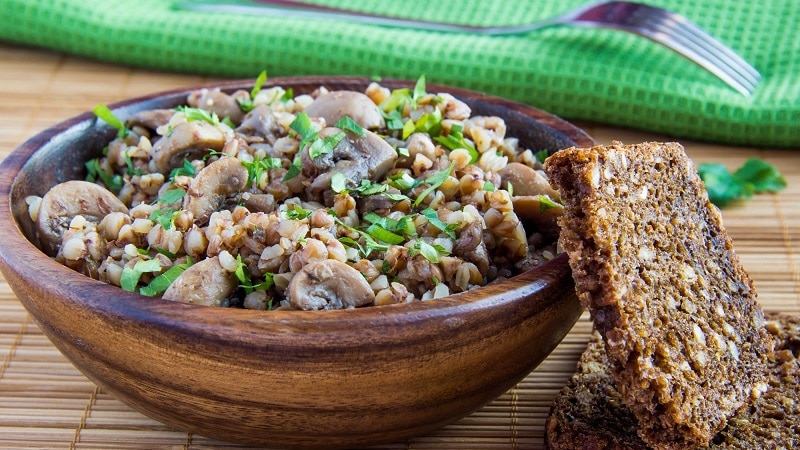What to do if your stomach is swollen and can buckwheat cause bloating?
Buckwheat is considered one of the most valuable and healthy products, because it has a rich vitamin and mineral composition, as well as biologically active components. These substances have a beneficial effect on the entire human body. But even the most useful products, if used incorrectly, can cause discomfort and harm your health. Whether the gas-forming product is buckwheat or not, you will find out from the article.
How does buckwheat affect the gastrointestinal tract?
Thanks to the composition Buckwheat has a beneficial effect on all body systems, including the digestive system. The product is almost always included in diets for both weight loss and medicinal purposes.
Mechanism of action
Buckwheat is soft and naturally cleanses digestive tract from waste and toxins. It contains fiber, which stimulates peristalsis, improves digestion and softens stool.
The vitamin and mineral composition normalizes the functioning of the gallbladder, kidneys, liver, and also reduces the acidity of gastric juice. That is why buckwheat is recommended to be included in the diet for gastrointestinal diseases.

Main active substances – cellulose and polyunsaturated fatty acids. They participate in the following processes:
- normalization of glucose levels;
- restoration of colon function;
- lowering cholesterol levels.
Buckwheat also contains nicotinic acid and B vitamins.These substances also have a good effect on the functioning of the digestive system.
The uniqueness of the product lies in the fact that it is used as for constipation, and with diarrhea. Crumbly porridge weakens, and during constipation, the cereal is steamed with boiling water and consumed in small portions without salt.
It is also recommended to eat buckwheat while losing weight, because thanks to the presence of fiber, it gives you a feeling of fullness for a long time. Porridge protects the mucous membrane of the digestive organs.
How does bloating appear?
There is always some amount of carbon dioxide in the stomach, because it is released when hydrochloric acid interacts with food. The duodenum also contains carbon dioxide, formed by the reaction between hydrochloric acid from the stomach and pancreatic juice.
Gases appear in the intestines:
- as a result of the activity of bacteria;
- during rotting and fermentation of food;
- from the circulatory system.
Symptoms
Bloating is an accumulation of gases in the intestines due to a malfunction of the digestive system. This is usually accompanied by an increase in abdominal volume, bloating and an unpleasant feeling of fullness inside.
Bloating occurs both during excessive formation of gases and insufficient removal of them. Gas retention usually begins to bother you in the afternoon. It is at this time that the digestive system works as actively as possible.
Discomfort most often goes away after visiting the toilet, but not always. In some cases, gas continues to accumulate.
Everyone experiences bloating from time to time. Most often it appears due to eating food that leads to increased gas formation.
Usually the swelling goes away quickly.But if there is constant discomfort and pain, this indicates the presence of some kind of pathology. To choose treatment tactics, it is important to identify the cause. To do this you will have to go to the doctor.

Why is it dangerous?
The bloating itself does not pose a danger to human health and life. However, the constant accumulation of gases often indicates the presence of serious diseases, including cancer.
Sometimes gases accumulated in the large intestine are toxic and cause harm to the body. In this case, the liver suffers the most.
Excess bubbles gradually turn into mucous foam, which covers the intestinal walls and interferes with the normal functioning of the gastrointestinal tract.
Bloating is considered a precursor and sign of the following diseases:
- dysbacteriosis;
- chronic pancreatitis;
- cirrhosis of the liver;
- irritable bowel syndrome;
- intestinal obstruction;
- cholecystitis;
- neurosis;
- gastritis.
Can buckwheat cause bloating?
If used uncontrolled and incorrectly, this product can cause bloating. The normal functioning of the digestive organs depends on the foods consumed, their quantity and combination with other foods.
Buckwheat promotes intense secretion of black bile and gases. The body is gradually accustomed to large portions of porridge. In this case, buckwheat is washed down with plenty of clean water. Otherwise, excessive consumption of buckwheat will lead to stomach cramps and flatulence.
Important! People prone to excessive gas formation are not advised to consume buckwheat every day. Also, they should not use the buckwheat diet to lose excess weight.
Why is this happening
Why buckwheat makes you swell:
- Binge eating. This is usually the reason why people experience flatulence.This happens especially often in cases where the product was undercooked or poorly steamed. Raw cereals are poorly absorbed by the body and cause heaviness in the stomach. When consumed in large quantities, increased formation of gases occurs.
- Combination with fatty foods. Bloating develops with the wrong combination of foods. Flatulence is caused by buckwheat with onions and fatty meats, fish, smoked meats and dairy products. In this case, the stomach remains full for a long time. Fermentation processes begin in it, which cause spasms, pain, discomfort and the release of excess gases.
- Eating a portion too quickly. At the same time, the person does not feel full and literally swallows the food. This leads to overeating, which causes gas to accumulate. The feeling of fullness comes about 20 minutes after eating. Therefore, it is recommended to chew buckwheat thoroughly to avoid overeating.
- Swallowing air. Nutritionists believe that almost 50% of the gases in the intestines are air, which people swallow while eating.
- Eating before bed. Eating buckwheat porridge 1-2 hours before bedtime leads to bloating. At night, the activity of the digestive system decreases. Food is not completely absorbed, remaining in the intestines until the morning. This causes a feeling of heaviness and discomfort. If it is not possible to eat 3-4 hours before bedtime, it is better to reduce the amount of porridge and not combine it with other foods.
- Smoking. Smoking has a very negative effect on the digestion process. A bad habit disrupts the secretion of enzymes and hydrochloric acid. Components from tobacco smoke irritate the gastric mucosa and disrupt intestinal function. Because of this, gas formation increases.Smoking also aggravates existing digestive diseases.

Can buckwheat help with bloating?
Buckwheat porridge helps improve intestinal motility and normalize digestive processes. Due to this, the formation of gases is reduced.
To do this, buckwheat is boiled in water, adding a little sugar and salt. Eat this dish for breakfast or lunch.
Tips and recommendations: what to do if your stomach is swollen
When flatulence is associated with poor nutrition, the menu is adjusted. Sweets, canned food, smoked meats, baked goods, and too salty and sweet foods are removed from the diet.
Instead, experts recommend consuming the following products:
- natural kefir or yogurt;
- cucumbers;
- bananas;
- asparagus;
- oatmeal;
- dill;
- fennel seeds or ginger root;
- mint or chamomile tea.
These products speed up metabolism and improve digestion, which reduces gas formation. They also remove excess moisture from the body and relieve tension from the muscles in the digestive tract.
Conclusion
If consumed incorrectly, buckwheat causes gas formation, despite the fact that it is considered a very healthy product. You should not overeat, combine porridge with fatty foods, or eat too quickly. When flatulence occurs, it is recommended to combine buckwheat with green vegetables, herbs and natural kefir.